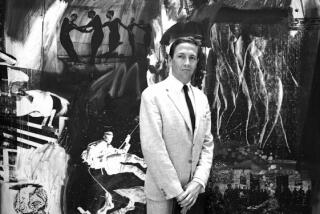THE VENICE SUMMIT : Reporter’s Notebook : For Watering Down Resolutions, What Better Site?
- Share via
VENICE, Italy — Most analysts here believe that the United States was thwarted by its allies in trying to produce a tough resolution Tuesday on the Persian Gulf at the Venice economic summit.
“You managed to water down these declarations pretty well,” a journalist told a French official.
“Well,” replied the official, “there is a lot of water in Venice.”
While President Reagan and the other leaders were preparing to pose for an official group portrait, he was pressed by reporters to say whether he hopes that Prime Minister Margaret Thatcher would win reelection in the British parliamentary elections Thursday.
The President tried hard to adhere to diplomatic protocol and withhold comment about another country’s election. But he finally blurted out, “Never talk about a no-hitter while it’s going on”--a reference to the American baseball superstition that no one should ever comment about a pitcher’s no-hitter until the last out.
Thatcher, now in her eighth year as prime minister, and her Conservatives hold a comfortable lead in the latest British opinion polls. British reaction to Reagan’s comment could not be obtained.
When Reagan and Thatcher met for morning talks at the Hotel Cipriani, a reporter asked the British leader if she were concerned about American policy in the Persian Gulf.
Although there was no food in sight, Thatcher, known for an icy manner with reporters, snapped, “I don’t answer questions over breakfast. You’ve tried that one before.”
An admiring President Reagan turned to Secretary of State George P. Shultz, Secretary of the Treasury James A. Baker III and White House Chief of Staff Howard H. Baker Jr. and said, “I’m going to remember that answer.”
The summit created some sad moments for 15 young American trombonists. Irwin Wagner, a professor of music at the University of Oklahoma, had organized a European concert tour for the musicians. A year ago, arrangements were made for them to play in the Piazza San Marco on Tuesday.
But Italian officials canceled the concert a month ago because of the summit. The trombonists decided to come to Venice anyway. They joined the crowd Monday afternoon, trying without success to get a glimpse of the leaders entering the Ducal Palace.
It didn’t take three American journalists long to realize the method in the madness of the Soviet journalists who approached them with three bottles of Italian wine when they stopped off at the San Giorgio Maggiore dining area for journalists covering the summit.
“Here, have some wine,” said Vitaly Choukseev, chief foreign editor of the Soviet news agency Tass.
As Choukseev engaged in small talk, two Soviet colleagues poured the wine. Then Choukseev, speaking English with a strong Russian accent, got to the point: “Reagan’s an idiot, an idiot. . . .
“The American media has destroyed Gary Hart,” he went on. “The media’s too powerful. It’s not the business of the media to delve into Gary Hart’s sex life.”
The Americans ended the conversation abruptly, insisting that Reagan, for all his political problems, is still a popular President and that the media had done their duty in reporting on a legitimate issue in a presidential campaign.
“They left us and went looking for more Americans,” said Kenneth Walsh of U.S. News & World Report.
Year after year, summits become more computerized. The leaders of the world’s seven industrialized democracies may be meeting in centuries-old palaces, but they are negotiating with space-age gadgetry that includes optic pens and electronic notebooks.
Most of the innovations came courtesy of Olivetti, the Italian corporation. At the request of the Italian government, Olivetti designed a system that allows the chiefs of state and government meeting in private to communicate by computer with their “sherpas,” the officials who prepared the agenda for the summit and are writing the final communiques. The sherpas can relay their drafts to the leaders by computer.
The leaders, writing with optical pens on electronic note pads, also can send immediate messages to their delegations.
Italy also has provided one free “hot line” to the leaders in Venice directly to their capitals.
Each delegation has been assigned an electronic work station. The video screens and control panels, set amid the hand-crafted bookshelves and Renaissance paintings of the 17th-Century Longhena Library, look as though they slipped through a time warp. “They do look a little out of place in here,” said Andrea Grammatico, an executive of Olivetti.
Times staff writers Jack Nelson, Don Cook and James Gerstenzang also contributed to this notebook.
More to Read
Sign up for Essential California
The most important California stories and recommendations in your inbox every morning.
You may occasionally receive promotional content from the Los Angeles Times.













